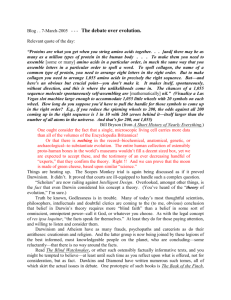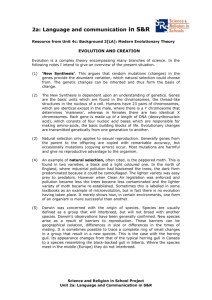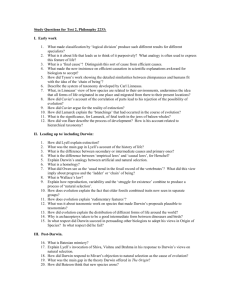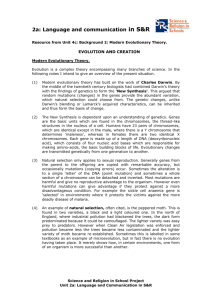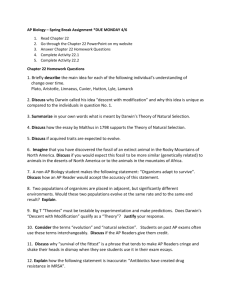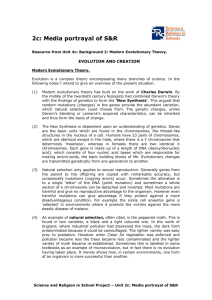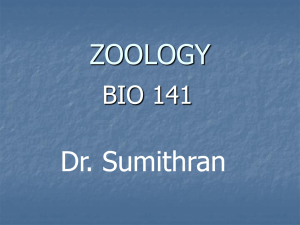Ctime801 The canonization of Charles Darwin
advertisement
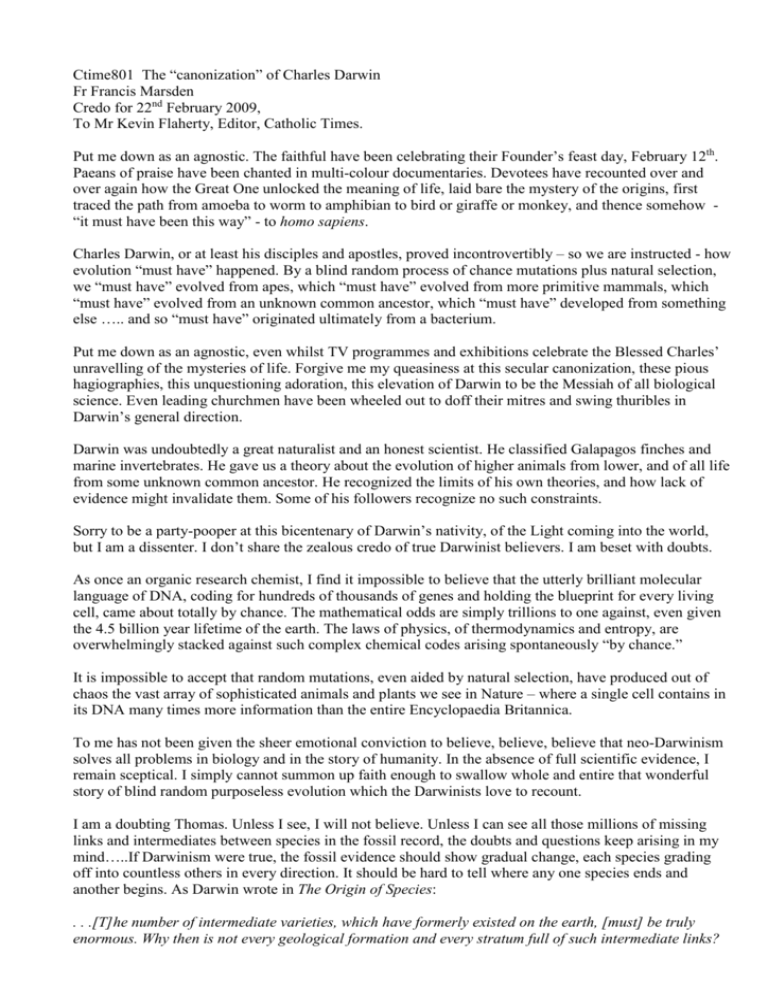
Ctime801 The “canonization” of Charles Darwin Fr Francis Marsden Credo for 22nd February 2009, To Mr Kevin Flaherty, Editor, Catholic Times. Put me down as an agnostic. The faithful have been celebrating their Founder’s feast day, February 12th. Paeans of praise have been chanted in multi-colour documentaries. Devotees have recounted over and over again how the Great One unlocked the meaning of life, laid bare the mystery of the origins, first traced the path from amoeba to worm to amphibian to bird or giraffe or monkey, and thence somehow “it must have been this way” - to homo sapiens. Charles Darwin, or at least his disciples and apostles, proved incontrovertibly – so we are instructed - how evolution “must have” happened. By a blind random process of chance mutations plus natural selection, we “must have” evolved from apes, which “must have” evolved from more primitive mammals, which “must have” evolved from an unknown common ancestor, which “must have” developed from something else ….. and so “must have” originated ultimately from a bacterium. Put me down as an agnostic, even whilst TV programmes and exhibitions celebrate the Blessed Charles’ unravelling of the mysteries of life. Forgive me my queasiness at this secular canonization, these pious hagiographies, this unquestioning adoration, this elevation of Darwin to be the Messiah of all biological science. Even leading churchmen have been wheeled out to doff their mitres and swing thuribles in Darwin’s general direction. Darwin was undoubtedly a great naturalist and an honest scientist. He classified Galapagos finches and marine invertebrates. He gave us a theory about the evolution of higher animals from lower, and of all life from some unknown common ancestor. He recognized the limits of his own theories, and how lack of evidence might invalidate them. Some of his followers recognize no such constraints. Sorry to be a party-pooper at this bicentenary of Darwin’s nativity, of the Light coming into the world, but I am a dissenter. I don’t share the zealous credo of true Darwinist believers. I am beset with doubts. As once an organic research chemist, I find it impossible to believe that the utterly brilliant molecular language of DNA, coding for hundreds of thousands of genes and holding the blueprint for every living cell, came about totally by chance. The mathematical odds are simply trillions to one against, even given the 4.5 billion year lifetime of the earth. The laws of physics, of thermodynamics and entropy, are overwhelmingly stacked against such complex chemical codes arising spontaneously “by chance.” It is impossible to accept that random mutations, even aided by natural selection, have produced out of chaos the vast array of sophisticated animals and plants we see in Nature – where a single cell contains in its DNA many times more information than the entire Encyclopaedia Britannica. To me has not been given the sheer emotional conviction to believe, believe, believe that neo-Darwinism solves all problems in biology and in the story of humanity. In the absence of full scientific evidence, I remain sceptical. I simply cannot summon up faith enough to swallow whole and entire that wonderful story of blind random purposeless evolution which the Darwinists love to recount. I am a doubting Thomas. Unless I see, I will not believe. Unless I can see all those millions of missing links and intermediates between species in the fossil record, the doubts and questions keep arising in my mind…..If Darwinism were true, the fossil evidence should show gradual change, each species grading off into countless others in every direction. It should be hard to tell where any one species ends and another begins. As Darwin wrote in The Origin of Species: . . .[T]he number of intermediate varieties, which have formerly existed on the earth, [must] be truly enormous. Why then is not every geological formation and every stratum full of such intermediate links? Geology assuredly does not reveal any such finely graded organic chain; and this, perhaps, is the most obvious and gravest objection which can be urged against my theory.” He attributed this problem to the meagreness of the fossils then collected. Surely the gaps would fill as palaeontologists gathered more and more of them. But no. This has not happened. As more fossils have been discovered, the geological pattern emerges not as one of gradual change from one species to another, but of long term stability, with sudden appearances and disappearances of species. Darwin knew nothing of DNA and genes. Now we do, and so we must ask: How likely is it that a species’ DNA mutates by pure chance to produce superior adaptations, when nearly all mutations lead to sickness and death? Why have all the failed mutants “disappeared” from the fossil record? Were they never there? Why do species appear stable for hundreds of millions of years without alteration? Why did so many animal phyla appear suddenly in the “Cambrian explosion”, 540 million years ago, without forbears or explanation? Furthermore, if, as Darwinism teaches, random mutations were the driving force of evolution, we might promote the evolution of humanity by arranging a Chernobyl-type explosion in every nation on earth, giving all human DNA a good blast of gene-altering radioactivity. Or we might increase the concentration of chemical mutagens in the environment – but here we hit a legal obstacle. Most of them are banned as carcinogens. Alas! Such heretical thoughts put the unbeliever under the fatwa of no less an Ayatollah for Atheism than Richard Dawkins himself: “It is absolutely safe to say that if you meet somebody who claims not to believe in evolution, that person is ignorant, stupid or insane (or wicked, but I'd rather not consider that).” Unquestioning Darwinism is de rigueur for the modern secularist. Ten days ago we were urged to celebrate “Darwin Day …………. in many different ways: civic ceremonies with official proclamations, educational symposia, birthday parties, art shows, book discussions, lobby days, games, protests, and dinner parties.” It is not Darwin’s science which is the problem for Christians, but the materialist philosophy which so often comes packaged with it, and which has no scientific basis. As Fr. Stanley Jaki OSB says: "Most Darwinists consider the scientific theory of evolution as a confirmation of the following: the process of evolution is utterly purposeless, there is only matter and motion; the universe is purely material and strictly uncreated; the human mind is a mere epiphenomenon [side–effect]of material processes." Indeed, Professor Richard Dawkins’ view of life is unremittingly bleak: “The universe we observe has precisely the properties we should expect if there is at bottom no design, no purpose, no evil and no good, nothing but pointless indifference.” Still, a comfortable Oxford chair and international fame seem to provide some temporary motivation for selfish genes. Or take Francis Crick, co-discoverer of DNA, who believed that human life (atheist philosophy included?) is reducible to mere chemical randomness.: “You, your joys and your sorrows, your memories and your ambitions, your sense of personal identity and free will, are in fact no more than the behaviour of a vast multitude of nerve cells and their associated molecules.” As a Christian, one might contentedly believe in a divinely planned and guided theistic evolution – an intelligent design behind all life. Indeed, Charles Darwin himself was never a hard-boiled atheist. He merely lapsed into an agnosticism about the Christian God. He still regarded himself as a theist, and spoke in places of God breathing life into organisms. But this explanation is what the today’s hardline neo-Darwinists will not permit. As far as they are concerned, there is no Creator, so blind evolution “must be” the explanation for everything. Classical philosophy has long objected to this type of materialism. Effects cannot exceed their causes. Conversely, causes must be adequate to the effects they produce. You don’t get something out of nothing. Despite this, the neo-Darwinists stubbornly insist that blind randomness “must be” the correct explanation of evolution, simply because it is the only variant which fits their atheistic materialism. From their atheistic faith arises the shunning of any mention of intelligent design, and their attempts to stigmatise all other viewpoints as “not scientific” or Biblical “fundamentalism.” Wiser words came from Joseph Cardinal Ratzinger. While leaving the question of evolutionary mechanisms to science, he stressed that the development of life was not a blind process, but an intended one. To back up his contention, he pointed to advances in biochemistry. “Let us go directly to the question of evolution and its mechanisms. Microbiology and biochemistry have brought revolutionary insights here. . . . It is the affair of the natural sciences to explain how the tree of life in particular continues to grow and how new branches shoot out from it. This is not a matter for faith. But we must have the audacity to say that the great projects of the living creation are not the products of chance and error. . . . (They) point to a creating Reason and show us a creating Intelligence, and they do so more luminously and radiantly today than ever before. . . . Human beings are not a mistake but something willed.” [In the Beginning: A Catholic Understanding of the Story of Creation and the Fall. (1986)]
